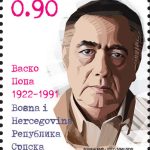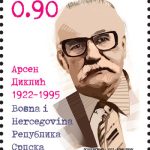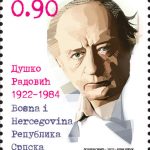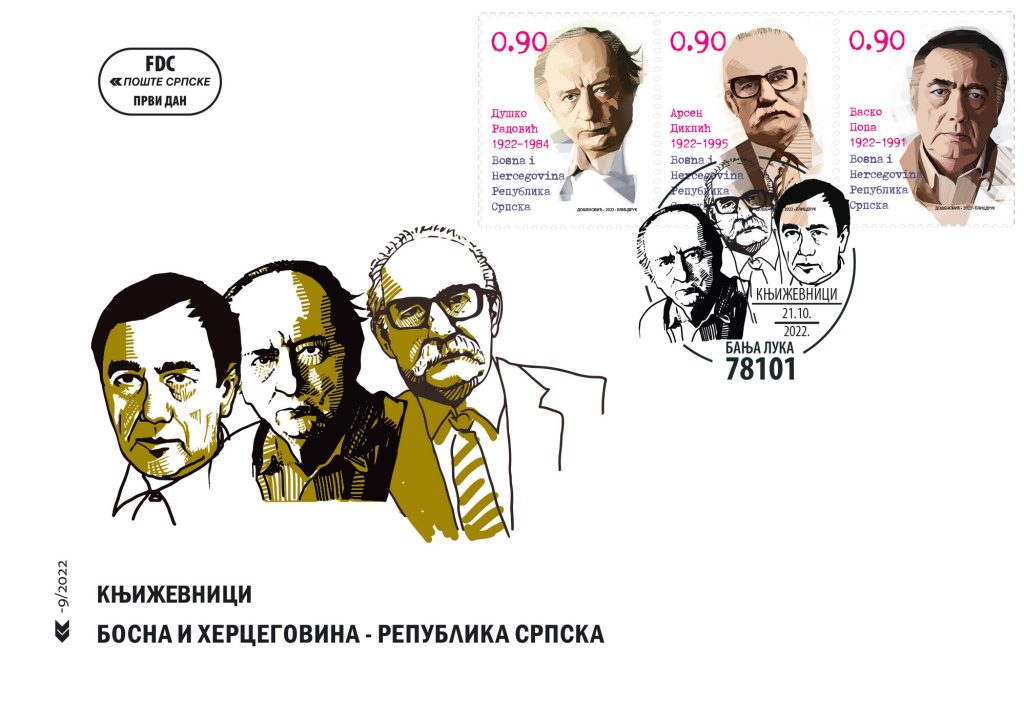Writers 2022
Title:: Writers
Date of Issue: 21.10.2022.
Author: Bozidar Dosenovic
Type edition: commemorative
Printing techniques: multicolour offset
Sheet: 12+4
Paper: muflep 100g
Printing House: Blicdruk, Sarajevo
 Motive: Vasko Popa
Motive: Vasko Popa
Каталошки број: 911
Perforation: 13 3/4
Face value: 0,90 BAM
Quantity: 15 000
 Motive: Arsen Diklic
Motive: Arsen Diklic
Каталошки број: 912
Perforation: 13 3/4
Face value: 0,90 BAM
Quantity: 15 000
 Motive: Dusko Radovic
Motive: Dusko Radovic
Каталошки број: 913
Perforation: 13 3/4
Face value: 0,90 BAM
Quantity: 15 000

Arsen Diklic is a Serbian writer, film and television screenwriter who, with his literary creations, ranks among the most important Serbian writers for children and youth. As a child, he fell in love with the river Gacka, where he also had his hidden boat, and later spent his best days on the Danube and the Sava. Many of his stories and poems arose from that love and dreams on the rivers, and one of the most beautiful is the poem "The Blue Whale". In his novels, Diklic describes events during the Second World War. In cooperation with Branko Bauer, he wrote the screenplay for the film "Don't turn around, son" (based on his novel of the same name), which won the "Golden Arena for Directing" at the Pula festival in 1956.
Dusan Dusko Radovic Serbian poet, writer, journalist, aphorist and TV editor. He is known to the widest audience for the aphorisms he used to wake up the citizens of Belgrade on the airwaves of Radio "Studio B". The program "Belgrade Good Morning" began to be broadcast in 1975, and was discontinued in 1982, when certain members of the ruling party characterized Dusko's aphorisms as "political messages with a pronounced moralistic and demagogic background." He wrote the script and lyrics of popular songs for the children's television series "Letter by letter". The works of this author have been translated into all major world languages. Radovic is the winner of our most prestigious awards as well as the diploma of the Hans Christian Andersen International Organization for Children's Literature.
Vasile Vasko Popa was a Serbian poet and academic. He was included among the 100 most famous Serbs. During World War II, he was imprisoned in the German concentration camp in Zrenjanin. After the end of the war, he graduated from the Romance group of the Faculty of Philosophy in Belgrade. Vasko Popa made a sharp turn in contemporary Serbian poetry in the early fifties when Popa's collection of poems Kora appeared. The appearance of Vasko Popa in post-war Serbian poetry marks a strong turn in relation to the poetic creativity of his contemporaries. Vasko Popa's poetic expression is inclined to aphorism, proverb, is elliptical and concise. Popa is one of the most translated Yugoslav poets and one of the founders of the Vojvodina Academy of Sciences and Arts in Novi Sad. He is the first winner of the "Branko Award" for poetry, in honor of the poet Branko Radicevic.
Author: MA Bozidar Dosenovic
Publisher: Poste Srpske a.d. Banjaluka
 1371
1371  kontakt@postesrpske.com
kontakt@postesrpske.com


